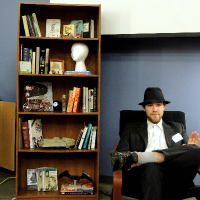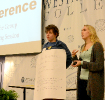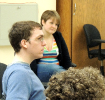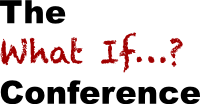02013
In 02013, around 200 people participated in our first two-day event. The first day we did group problem solving focused on education. The second was a day of presentations, installations, and performances.
We'll be posting videos as we publish them.






What if we could bring back extant species?
Josh Kling is a budding naturalist who is passionate about life. More specifically, he is passionate about lifeforms. His passion drives him to try to find strange and remarkable things no one else has seen before. He is a future researcher who dreams of pushing our understanding of the natural world and enhancing our awe of it. Future accomplishments include: the reintroduction of extant large animal species to North America and the discovery of life on another planet.
What if women were in charge?
Cinnamon Brown is an Assistant Professor of History at Westminster College. She received her B.S. from the University of West Alabama and her Masters and Ph.D. from the University of Tennessee. Although her research focuses on territorial New Orleans, she loves to teach classes in a variety of areas such as women and African Americans. Her interests in these subjects have inspired some of her favorite courses including Scandalous Women in American History and American Slavery. When not at Westminster, Cinnamon loves to spend time with her husband Mark and their two cats LBJ and Josephine. She also loves reading, jogging, and fighting for women's causes.
What if we were all poets?
Caroline has no idea what she wants to be when she grows up, but thinks the following sound super cool: professional trivial pursuit player, This American Life reporter, writer, gypsy, sex educator, political activist, professional feminist, curator of cool, tea connoisseur, Stephen Fry. Until she finds a way to unite them all, wearing the label storyteller will have to do. Caroline will graduate from Westminster College in May after studying English and political science.
What if you're wearing big, ugly glasses?
Nathan is currently a student at Westminster College.
What if I'm wrong?
Future man will likely divide time into two eras, before the time of Ethan Porter and after (BEP and AEP, respectively)... When he is not making ridiculously hubristic statements he can be found making other ridicules claims, usually, but not always (sometimes for fun), designed to get his interlocutors to stop, think, and justify their position. These question topics include, but are not limited to, philosophy (of mind, meta-ethics, ethics), science (genetics, evolution, evolutionary psychology, neuroscience), politics (as a Libertarian he must defend attacks by both fronts), religion, and anything else that sounds interesting or could be made to sound interesting. When he is not arguing with others (he prefers the term "discussing") he spends his time weight lifting (he is particularly enthralled with Crossfit at the time), reading, t'workin noobs on Halo, and enjoying a well balanced beer.
What if there had been no religion?
Cliff Cain cannot decide whether he is a resident of Jerusalem as a person of faith or a resident of Athens as a person who thinks. So, he has dual citizenship and carries a passport that allows movement between the two areas. A university basketball player as a student, he was also an NCAA coach of the year when he was starting his professorial career. He also played in a symphony and a rock group to work his way through grad. school, but it was so long ago that he cannot remember whether he played first chair, second chair, or just set-up chairs. He still enjoys playing the trombone as a member of the Westminster College Pep Band. He is currently Harrod-C.S. Lewis Professor of Religious Studies at WC and went a long time to school to receive a doctorate in religion and a doctorate in science because of his intention of delaying getting a real job for as long as possible.
What if technology is killing privacy?
Dr. Tobias T. Gibson is associate professor of political science, lives in Fulton, is a proud Hoosier and is a social wallflower who blends.
What if McCarthyism and the Red Scare never happened?
Jefferson is an arguer. If he has nothing better to do, he will argue with you about any topic, ranging from political debate to musical tastes to whether or not you know anything. When he isn't arguing, he spreads his time between the Internet, writing poetry, doing nerd activities, pondering the inherent dichotomy in being a Southern-born Communist, wondering why the FBI considers him to be a gang member, or generally doing nothing in particular. Don't take anything he says personally unless there is no room for interpretation. He probably doesn't care that you're offended, but he probably didn't mean to offend you either.
Stay connected to see more presentations when we post them!
Sponsors
It's hard to run something this large without a little help from your friends. We really appreciate these people. They're helping us launch this ship.
From Indiegogo
- Carolyn Perry
- Cathi Harris
- Center for Engaging the World (of Westminster College, Fulton, MO)
- Chelsea Tuthill
- David Quirk
- Diane Ridgway-Cross
- Heidi Lavine
- Kathleen McKinney
- Keith Hardeman
- Kris Lensmeyer
- Kristen Fisher
- Libby Paulsen
- Matthew Murrie
- Miran Milavic
- Nikki Kimball
- Patricia McHugh
- Sandy Pitts
- Stephanie McHugh
- Steve and Nancy Murrie
- Tyler Haulotte
- Wayne Zade
- Anonymous
- Anonymous
- Anonymous
- Andrew R McHugh
- Carolyn Perry
- Christopher Halsey
- Joseph Munyambanza
- Matt Murrie
- Todd Reutlinger
- Sombiniaina Herimpitiavana
- Heather Biehl
- Paul Kavanaugh
- Cliff Cain
- Billy Paulsen
- Joseph Marlo
- Want to be up here?







